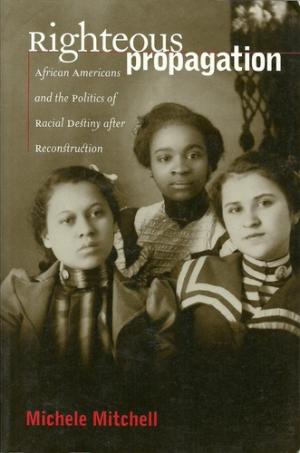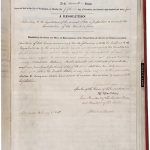by Ava Purkiss
Michele Mitchell’s Righteous Propagation is a fascinating study of the tactics African Americans used to bolster racial uplift after Reconstruction. Mitchell presents the book as a social history, revealing moments when African Americans shared ideas on ways to advance the race during the Progressive Era at the end of the 19th and beginning of the 20th centuries.  In the prologue, Mitchell explains, “No longer divided into categories of ‘free’ or ‘slave,’ people of African descent acted upon assumptions that the race was unified, that institution building was possible, that progress was imminent.” This optimism shaped ideas about collective identity, destiny, and improvement of the race.
In the prologue, Mitchell explains, “No longer divided into categories of ‘free’ or ‘slave,’ people of African descent acted upon assumptions that the race was unified, that institution building was possible, that progress was imminent.” This optimism shaped ideas about collective identity, destiny, and improvement of the race.
Early in the book, Mitchell outlines the ways African Americans idealized emigration to Liberia; the working poor embraced transplantation to Africa as a way to seek economic refuge. She also asserts that African Americans linked emigration, black colonization in Africa, and the reclamation of manhood. Here, Mitchell points out an interesting contradiction, explaining that the move to Africa had imperialist overtones, yet many African Americans were united in opposing white imperialism. Mitchell also discusses sexuality in the context of racial progress: the proper “choice of sexual partner, courtship, heterosexual intercourse, reproduction…,” were all imperative to the racial destiny of African Americans and pervasive in the discourse on racial progress. Surprisingly, she discovered that within the discussion of sexual politics, African Americans championed eugenic strategies such as birth control advocacy, sexual purity crusades, and “better babies” campaigns to counter racist ideas about biological inferiority.
Focusing on everyday life, Mitchell discusses the importance of cleanliness and living conditions in the black home, and the burdens black women carried at this time: “[African American women] were simultaneously caricatured by white Americans as diseased contaminants and characterized by Afro-Americans as primary agents in regenerating the race’s home life.” In serving as both agents and targets, African American women were an essential contradiction in the circulation of ideas about racial destiny and improvement. The final chapter examines miscegenation and the ways individual choices about romantic partners affected the race as a whole. The author highlights the ways black nationalism, namely the ideologies of Marcus Garvey, stipulated ideals of sexual conduct, masculinity, racial purity, and marriage, which factored into the intimate lives of African Americans and their effort to achieve progress and solidarity.
Righteous Propagation expertly describes the various ways African Americans perceived racial destiny and progress in the post-Reconstruction era. Mitchell recognizes that African Americans sought respect, freedom, and egalitarianism by disseminating ideas that would benefit the race, but sometimes reinforced the racist tactics that were perpetrated against them. In doing so, Mitchell does not romanticize the efforts of African Americans, but complicates some of their methods for uplift.



